Job Description
A professional recovery coach is a life coach who works with someone during their addiction recovery process.
They help their clients make better life decisions and choices, specifically alternate activities to drug abuse.
A recovery coach may work with their clients every day or a few times a week or set up an on-call coaching style when clients need them.
Duties
As a professional recovery coach, you will have many duties that help your clients stay sober.
You will:
- Talk with clients and give them support during recovery
- Identify professional medical support that can help a client, such as a psychiatrist
- Find positive activities for a client, including working out or volunteering
- Accompany clients to 12-step meetings and other rehab processes
- Sponsor clients during their recovery process
Note that a recovery coach is not a psychiatrist or therapist.
They can’t and shouldn’t provide physical or mental health advice. Instead, they can help their client make better decisions and work directly with them to keep them focused during a long and challenging recovery process.
Salary
The average salary for a professional recovery coach is about $32,000 every year or just over $15 an hour.
Salaries may vary depending on your position, including whether you work full-time with an inpatient facility or have a freelance coaching career that you farm out to others.
The highest salary for this career is about $36,000, which is most common when pairing with a facility with a significant funding base.
However, you can also make more money by taking on side gigs, such as counseling with multiple facilities or becoming a traveling counselor.
Annually National Average Salary: $58,910
Average Annual Salary by State
| State | Avg. Annual Salary |
|---|---|
| Alabama | $61,180 |
| Alaska | $42,810 |
| Arizona | $60,960 |
| Arkansas | $50,630 |
| California | $62,850 |
| Connecticut | $66,170 |
| Delaware | $55,080 |
| District of Columbia | $99,740 |
| Florida | $58,100 |
| Georgia | $50,570 |
| Hawaii | $56,910 |
| Idaho | $60,160 |
| Illinois | $61,430 |
| Indiana | $49,260 |
| Iowa | $52,140 |
| Kansas | $48,830 |
| Kentucky | $57,140 |
| Louisiana | $78,720 |
| Maine | $60,140 |
| Maryland | $68,620 |
| Massachusetts | $63,050 |
| Michigan | $58,350 |
| Minnesota | $59,210 |
| Mississippi | $65,650 |
| Missouri | $52,630 |
| Montana | $45,850 |
| Nebraska | $60,780 |
| Nevada | $54,210 |
| New Hampshire | $57,420 |
| New Jersey | $84,980 |
| New Mexico | $54,880 |
| New York | $64,020 |
| North Carolina | $59,630 |
| North Dakota | $45,000 |
| Ohio | $50,340 |
| Oklahoma | $57,330 |
| Oregon | $60,150 |
| Pennsylvania | $64,030 |
| Rhode Island | $60,710 |
| South Carolina | $56,500 |
| South Dakota | $41,950 |
| Tennessee | $52,210 |
| Texas | $52,570 |
| Utah | $55,640 |
| Vermont | $58,770 |
| Virginia | $58,430 |
| Washington | $57,320 |
| West Virginia | $66,580 |
| Wisconsin | $53,930 |
| Wyoming | $68,100 |
| Puerto Rico | $34,380 |
Annual Average Salary: Top 5 States
The top earning state in the field is District of Columbia, where the average salary is $99,740.
These are the top 5 earning states in the field:
* Employment conditions in your area may vary.
How to Become
Step 1 Step One: Earn a High School Diploma
Though recovery coaches don’t need extensive education, they’ll need a minimum of a high school diploma.
That’s because you’ll need to show you have the basic skills necessary to handle various vital steps, such as preparing case reports and working directly with a client during training.
Note that a GED is an acceptable alternative if you dropped out, and most GED programs can be completed in less than a year.
You can earn this degree at an alternative educational facility in your area.
Step 2 Step Two: Sign Up for Training
Though you can take multiple certification exams to become a recovery coach, including the Certified Addiction Recovery Coach (CAC) program, you should get training first.
Multiple training programs can help you transition to this certification. Independent training firms often provide hands-on education, including information about addiction and proper recovery coaching steps.
Complete this training, which typically takes around 200 hours, to learn everything about becoming a recovery coach.
You’re now prepared to take the certification exam.
Step 3 Step Three: Get Certified
After completing 60 hours of approved coach training hours, 34 hours of core self-study, 12 hours of buddy coaching, and 16 hours of CAC niche self-study, you can apply for ICF certification.
If you want to apply for the more extensive BCC certification test, you need 82 CCE-approved hours towards that credential and 16 hours in the CAC niche self-study course.
After completing this training and learning coaching application, communication skills, core competencies, assessment skills, and business development, take the certification exam.
Find a certification exam site or an online program you can attend and schedule your test.
Once you pass, you can start looking for jobs within this field.
Step 4 Step Four: Find a Job
Once you finish your credentialing process, you can reach out to various addiction treatment centers.
Find inpatient and outpatient centers that need a professional recovery coach.
You can also contact them and ask about setting up a new position.
While not always available, this option streamlines the process and improves your chances.
Contact hospitals and other medical facilities in your area to see if they need recovery coaches.
Often, hospitals provide addiction treatment and may need someone with your training.
You can also set up a business as a freelance recovery coach.
You’ll have to handle the proper legal steps, including applying for a company license and finding clients.
Note that some facilities even offer online recovery coaching options, meaning you can connect with people across the country and support them through treatment.
Step 5 Step Five: Expand Your Position
After you find a job, provide high-quality coaching for your clients and continually seek ways to improve your position.
For example, you may become a recovery coach manager.
Typically, a manager helps a team of professional recovery coaches handle their caseload, find clients, and provide high-quality support for their clients.
You can also get experience with an addiction recovery firm and then transition to owning a business if you want.
This option works well for people who prefer working independently.
While you’ll make more money as an independent business owner, your risks are higher.
As a result, it’s essential to research this option before making a choice.
Popular Programs
Education
As a professional recovery coach, you don’t need specialized education, such as a bachelor’s or master’s degree.
Though having a counseling, psychiatry, or another health-related degree may improve your chances of finding a job, your education focuses primarily on your certification process.
In a CAC training program, you’ll cover several subjects that make you a better recovery coach.
Coaching Application
This subject covers essential coaching duties and helps you understand how to apply them.
You’ll learn the day-to-day tasks of a recovery coach, how these support your client, and ways to improve your capabilities.
Most training programs provide hands-on support through these classes, including specialized help from a teacher who understands your learning method.
Coach Communication
Coaching focuses heavily on communication, and you’ll learn how to encourage and listen to your clients and help them avoid abusing substances.
You’ll master careful listening methods, including signs that your client needs extra support.
Just as importantly, you get hands-on lessons in empathetic communication, including how to encourage your client without lying to them.
Core Coaching Competencies
During these studies, you’ll learn about important skills that improve your coaching, such as empathy, understanding, self-motivation, and friendliness.
You’ll get the chance to practice many of these competencies with real people, including those with addiction.
Your professor will help correct any errors you may make to ensure you provide high-quality support.
Tools & Assessments Application
Professional recovery coaches have multiple tools and assessments that they use to provide high-quality support for their clients.
These include assessment worksheets, software, and tracking programs that help them follow their clients’ progress.
You’ll get hands-on training with these tools to ensure that you understand and use them properly when you start your career.
Business & Career Development
This subject covers subjects like building a new business from the ground up, building a high-energy career, how to lecture and discuss issues properly, and the methodologies needed for your position.
You’ll also learn how to make stronger business connections with addiction treatment facilities, particularly if you want to start an independent business for yourself.
Video About The Career
Certification & Licensing
Certification is required in some states, but a degree is not required.
Average Training Program Duration: 0-6 Months
Job Outlook
The job outlook for a professional recovery coach is 22% over the next 10 years.
That’s much higher than the market average of just 6% over the same period.
This outlook is so high because addiction remains a persistent problem that affects the lives of millions.
Dozens of new addiction facility centers are likely to open during this 10-year period.
As a result, there’s a high demand for professional recovery coaches.
During this time, salary is likely to increase, mainly if the supply of available coaches stays so low.
That makes this career an excellent option for someone who’s interested in helping other people recover from addiction-related health problems.
After all, your training should take no more than a few months, and your salary is decent right away.
As demand increases, you’ll likely find even higher-paying jobs in the future.
Employment Growth Projection: 9%
2023
2033
That's a higher than average projected growth of 26,900
Should You Become a Professional Recovery Coach?
Overall Satisfaction: High

Satisfaction in this career is typically reasonably high, though that varies depending on a few factors.
For example, one study found that better mentoring from supervisors and a recovery-focused approach helped improve satisfaction in this career.
More role clarity, including defined duties, can help make this career more enjoyable.
The heavy workload of this position was the biggest downside of this job for most people.
However, satisfied coaches praised the hands-on approach of this job and the ways it helped others.
Average Salary: Medium

The average salary of $32,000 may seem reasonably low compared to other medical professionals.
However, your training is much less costly, and you can begin a job in this field far quicker.
Note that some studies find that independent recovery coaches may make up to $63,000 every year.
As a business owner, your workload will be much higher, and you might need to hire other coaches to help run your company, especially if you get a heavy client load.
That makes it essential to balance your role very carefully.
Job Growth Outlook: High

If you want to join a field with a great outlook and a promising future, this job may work well for you.
With a 22% increase in the next 10 years, you’ll find it reasonably easy to find a career within this field, especially if you don’t mind an entry-level job.
While advancement opportunities are limited in recovery coaching, options like starting a new business or managing a team give you some chances to grow in your job.
Management often becomes a high-earning job, with income approaching $50,000.
Education Duration: 0-6 Months

Your education for this career should take no more than a few months to complete.
Most people finish their training in as little as three months, though some may take longer if they already have a job or want to avoid burnout.
Burnout is a common problem that affects far too many people.
Though you can get an associate’s, bachelor’s, or master’s degree to start in this field, you don’t need any of these degrees to begin.
That gives this career a high training-to-earning value, as you can start your career far more quickly than you can in other medical jobs.
Personal Skills Needed

If you’re interested in a career as a personal recovery coach, you need to make sure that you have the following skills to ensure that you’re comfortable with the unique demands of this position:
- Empathy
- Case management
- Listening and responding
- Organization
- Community Outreach
- Relapse prevention
- Trauma-informed care
- Problem-solving
- Stages of change model
- Cognitive behavioral therapy (CBT)
- Patience
- Advocacy
- Motivational interviewing
- Writing
- Report production
- Medical field knowledge
- Ability to work with multiple care providers
Frequently Asked Questions
How long do you have to go to school to become a professional recovery coach?
You typically don’t need to attend school long to become a recovery coach.
Most addiction treatment centers only ask for a high school diploma or GED, with certification training from a licensed professional.
This training includes a few months or so of hands-on support, including learning about how to provide high-quality coaching for your clients.
As a result, you can typically start a career in this field reasonably quickly and with minimal training.
How much money does a professional recovery coach make a year?
Typically, a recovery coach will make about $28-36K every year, depending on your position and where you live.
For example, coaches in areas with a higher cost of living typically make more to ensure that they get the money they need to live.
Note that independent coaches can make more money if they create a high-earning contract with facilities.
That said, all addiction treatment centers have limited funding that’s often based on grants and donations and may not be able to offer a high wage.
What kind of education do you need to be a professional recovery coach?
You’ll only need a high school degree and in-depth CAC training to start a career as a recovery coach.
This educational process includes in-depth and hands-on classes that immerse you in your job duties.
Once finished, you can take the certification exam and look for a job.
Note that you can earn a psychology degree and start a career in this field, which may increase how much money you make in some facilities.
That said, you don’t need any specialized education beyond your basic certification training.
What skills do you need to have to be a professional recovery coach?
As a professional recovery coach, you need to focus heavily on skills like empathy, listening, communication, and crisis management.
You might run into dangerous situations with your clients, including overdoses, that must be handled quickly and effectively.
Furthermore, you’ll need strong writing skills to create reports and other updates for your team.
Reports must accurately and fairly discuss your client’s needs and highlight ways to improve them.
You’ll share these reports with their counselors and doctors to provide better care.
Are professional recovery coaches in high demand?
The job outlook for professional recovery coaches is high, with a 22% increase in the next 10 years.
That’s much higher than the national 6% average for all professionals, meaning that there is a very high demand for this job.
You’ll typically see a higher need for this profession in bigger cities, where drugs may be more common and treatment more frequent.
Facilities in these areas can include a myriad of different options, including hospitals and inpatient therapy centers.
 Professional Recovery Coach Info by State
Professional Recovery Coach Info by State

- Alabama
- Alaska
- Arizona
- Arkansas
- California
- Colorado
- Connecticut
- Delaware
- Florida
- Georgia
- Hawaii
- Idaho
- Illinois
- Indiana
- Iowa
- Kansas
- Kentucky
- Louisiana
- Maine
- Maryland
- Massachusetts
- Michigan
- Minnesota
- Mississippi
- Missouri
- Montana
- Nebraska
- Nevada
- New Hampshire
- New Jersey
- New Mexico
- New York
- North Carolina
- North Dakota
- Ohio
- Oklahoma
- Oregon
- Pennsylvania
- Rhode Island
- South Carolina
- South Dakota
- Tennessee
- Texas
- Utah
- Vermont
- Virginia
- Washington
- West Virginia
- Wisconsin
- Wyoming
Professional Recovery Coach Resources
- 14 Pros and Cons of Being a Professional Recovery Coach
- Best Online Professional Recovery Coach Training Programs
- How Much Does It Cost to Become a Professional Recovery Coach?
More Medical Careers
| Career | |
|---|---|
 | Certified Nursing Assistant Working as a Certified Nursing Assistant is an entry-level role that will give you hands-on experience when you are ready to take the next step in your medical career. |
 | Dental Assistant Dental assistants help dentists to provide patient care, keep records, and care for the dental equipment. |
 | Dental Hygienist Dental hygienists take care of cleaning teeth to promote hygiene and help avoid cavities and gum problems. |
 | Dialysis Technician Dialysis technicians maintain and monitor dialysis equipment, and also act as primary caregivers for patients undergoing dialysis treatment. |
 | Dog Groomer Dog groomers attend to grooming dogs, usually at dog salons or big pet-related chain stores. |
 | Healthcare Administrator Healthcare administrators – also known as healthcare executives or health services managers – are responsible for the planning, direction, and coordination of medical and health services. |
 | Home Health Aide Home health aides provide home care to individuals who require assistance in their day-to-day living. |
 | Licensed Practical Nurse (LPN) Licensed Practical Nurses provide basic nursing care to patients and work with Registered Nurses and Doctors. |
 | Medical Assistant Medical assistants support the work of physicians, nurses, and other health professionals. |
 | Medical Biller and Coder Medical billers and coders manage, organize, and code various health information data. |
 | Medical Technologist Medical laboratory technologists collect bodily samples and conduct tests to analyze those samples. |
 | Medical Transcriptionist Medical transcriptionists go over voice recordings to convert them into written texts. |
 | Nutritionist As a Nutritionist, you’ll be tasked with creating meal plans, counseling, and understanding dietary restrictions for all types of clients. |
 | Patient Access Representative The work involves helping people to orient themselves to the space and everything that is going on. |
 | Patient Care Technician Patient care techs work directly with patients helping them with daily activities and assist the medical staff by measuring and monitoring the patients' vital signs among other tasks. |
 | Pharmacy Technician Pharmacy technicians provide patients with medications through prescription or over the counter. |
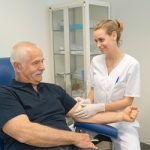 | Phlebotomist As a Phlebotomist, it will be your responsibility to take blood samples from patients and send them to the lab for further testing. |
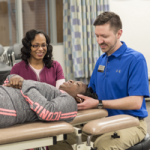 | Physical Therapist Assistant Physical therapist assistants provide physical therapy services to patients and aide to physical therapists. |
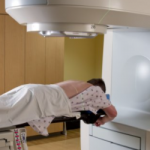 | Radiation Therapist Allied health provisional who specializes in radiation oncology treatments. |
 | Registered Health Information Technician Registered Health Information Technician (RHIT) help store and verify accuracy of health records as well as analyze patient data. |
 | Registered Nurse (RN) Registered Nurses provide hands-on patient care in various settings, mainly hospitals, and clinics. |
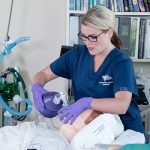 | Respiratory Therapist Respiratory therapists treat and care for patients who experience breathing difficulties. |
 | Sterile Processing Technician A sterile processing technician is a healthcare professional who is responsible for preparing, sterilizing, maintaining, packaging, and storing medical tools and equipment used in surgical and other medical procedures. |
 | Surgical Technologist Surgical technologists – also known as operating room techs – prepare operating rooms and assist doctors and nurses during surgical procedures. |
 | Vet Office Manager Veterinary office managers work to make sure that the daily operations run smoothly and efficiently at veterinary hospitals or veterinary clinics. |
 | Veterinary Assistant Veterinary Assistants work closely with Veterinarians to handle routine animal care. |
 | Veterinary Technician Veterinary Technicians assist veterinarians as well as diagnosing and treating animals, mostly in private clinics. |
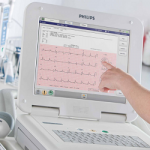 | EKG Technician EKG technicians test and monitor the cardiovascular system. |
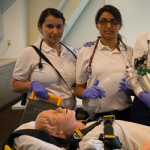 | EMT Trained emergency medical technician that arrives at the scene to provide medical services such as resuscitation. |
 | MRI Technologist MRI Technologists use a machine to scan the body and create a detailed image of the inside for doctors to analyze. |
 | Optician Opticians are technicians and salespersons at the same time who spends most of their day talking to customers, reading prescriptions written by doctors, and dispensing glasses and lenses. |
 | Ultrasound Technician Ultrasound technicians aid physicians in monitoring and diagnosing patients through the use of ultrasonic imaging technology. |
 | X-Ray Technician X-Ray Technicians are medical imaging professionals who use technology to visualize the inside of our bodies. |














